"May 28 (148)
was when at the time of Bharani (Yoni, the female organ
for reproduction) the Sun had reached the star at the center (Al
Wasat, the Middle)
and half a year later, at glyph 227 (» π),
it was the
Full Moon's turn, in "November 26 (*250), to reach
δ Gemíni (Wasat).

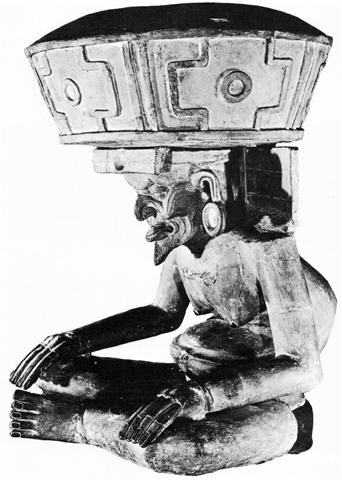
The protruding tongue of the old central god at the
bottom of the sea -
Xiuhtecuhtli,
the fire god, as Huehueteotl, 'the old god at the centre'
-
was the same
sign as in the front ornament of
a Maori war canoe:
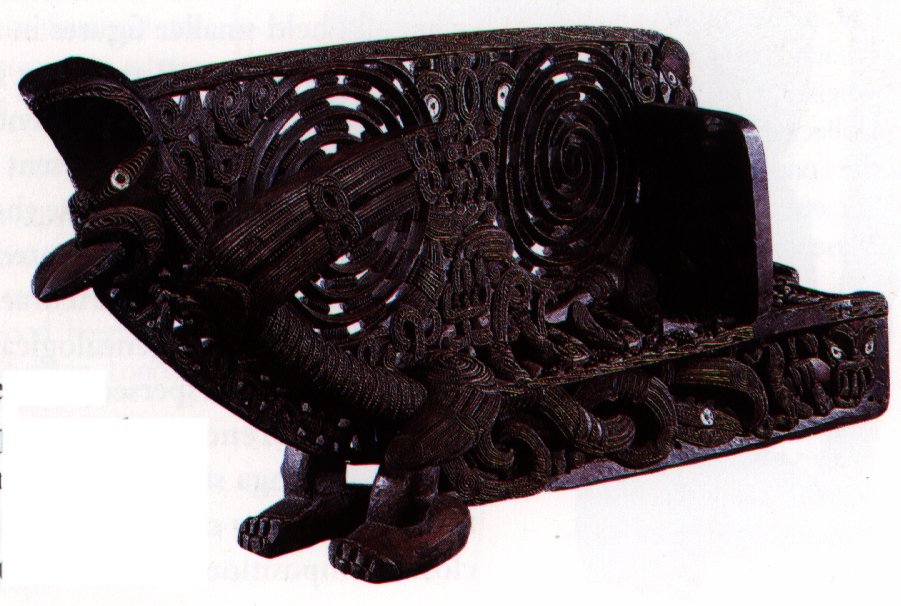
... given the mana of war canoes, the
stern and prow ornaments depicted central themes in Maori
cosmogony.
Many prows
depict the creation of the earth and sky.
The
openwork spirals on the main panel may represent the entry of
light and knowledge into the world when the god
Tane separated his
parents Papatuanuku and Rangi, Earth Mother and
Sky Father. The foremost figure depicts a male with aggressively
protruding tongue. He may represent Tuumatauenga, the god
of war and man ...
|
MAY 3 |
4 (124) |
5 |
6 (*46) |
7 |
 |
 |
 |
 |
 |
|
Ga2-13 |
Ga2-14 |
Ga2-15 (45) |
Ga2-16 |
Ga2-17 |
|
WEZEN (Weight)
= δ Canis Majoris
(107.1), τ Gemini (107.7), δ
Monocerotis (107.9) |
no star listed (108) |
λ Gemini (109.4),
WASAT
(Middle)
= δ Gemini
(109.8) |
no star listed (110) |
ALUDRA (Virgin)
= η Canis Majoris
(111.1),
PROPUS = ι Gemini
(111.4),
GOMEISA = β Canis Minoris
(111.6) |
|
July 6 |
7 (188) |
8 |
9 |
10 (*111) |
|
°July 2 |
3 (184) |
4 |
5 |
6 (*107) |
|
'June 9 |
10 (161) |
11 |
12 |
13 (*84) |
|
"May 26 |
27 |
28 (148) |
29 |
30 (*70) |
|
NAKSHATRA DATES: |
|
NOVEMBER 2 |
3 (*227) |
4 |
5 |
6 (310) |
|
Al Baldah-19
AL BALDAH = π Sagittarii,
ALPHEKKA MERIDIANA = α Cor.
Austr.
(290.1), β Cor. Austr. (290.2) |
ALADFAR
(The Talons of the Eagle)
(291.1),
NODUS II = δ Draconis
(291.5), ψ Sagittarii (291.6), τ
Draconis (291.7), θ Lyrae
(291.8) |
ω
Aquilae (292.1),
ρ Sagittarii
(292.6), υ Sagittarii (292.7) |
π
Draconis,
ARKAB PRIOR = β¹ Sagittarii
(293.0),
ARKAB POSTERIOR = β² Sagittarii,
ALRAMI (The Archer)
= α Sagittarii
(293.2),
χ Sagittarii
(293.6) |
DENEB OKAB (
Eagle's Tail)
= δ Aquilae (Ant.)
(294.0),
α VULPECULAE (Little Fox)
(294.9) |
|
January 5 (*290) |
6 |
7 (372) |
8 |
9 |
|
°January 1 |
2 |
3 (*288) |
4 |
5 (*290) |
|
'December 9 |
10 (*264) |
11 (345) |
12 |
LUCIA |
|
"November 25 |
26 (*250) |
27 |
28 (360) |
29 |
... The seventh tree is the oak, the
tree of Zeus, Juppiter, Hercules, The
Dagda (the chief of the elder Irish
gods), Thor, and all the other
Thundergods, Jehovah in so far as he was
'El', and Allah. The royalty of the
oak-tree needs no enlarging upon: most
people are familiar with the argument of
Sir James Frazer's Golden Bough,
which concerns the human sacrifice of
the oak-king of Nemi on Midsummer Day.
The fuel of the midsummer fires is
always oak, the fire of Vesta at Rome
was fed with oak, and the need-fire is
always kindled in an oak-log.
When Gwion writes in the Câd Goddeu,
'Stout Guardian of the door, His name in
every tongue', he is saying that doors
are customarily made of oak as the
strongest and toughest wood and that
'Duir', the Beth-Luis-Nion name for
'Oak', means 'door' in many European
languages including Old Goidelic
dorus, Latin foris, Greek
thura, and German tür, all
derived from the Sanskrit Dwr,
and that Daleth, the Hebrew
letter D, means 'Door' - the 'l' being
originally an 'r'.
Midsummer
is the flowering season of the oak,
which is the tree of endurance and
triumph, and like the ash is said to
'court the lightning flash'. Its roots
are believed to extend as deep
underground as its branches rise in the
air - Virgil mentions this - which makes
it emblematic of a god whose law runs
both in Heaven and in the Underworld ...
The month, which takes its name from
Juppiter the oak-god, begins on June
10th [cfr Ga2-14] and ends of July 7th. Midway comes
St. John's Day, June 24th, the day on
which the oak-king was sacrificially
burned alive. The Celtic year was
divided into two halves with the second
half beginning in July, apparently after
a seven-day wake, or funeral feast, in
the oak-king's honour
...
|
171 |
OCTOBER 26 |
27 (300) |
28 |
29 |
30 |
31 (*224) |
 |
 |
 |
 |
 |
 |
|
Ga8-16 |
Ga8-17 (220) |
Ga8-18 |
Ga8-19 |
Ga8-20 |
Ga8-21 |
|
ζ Pavonis
(283.4), λ Cor. Austr. (283.6),
DOUBLE DOUBLE
= ε Lyrae
(283.7),
ζ Lyrae
(283.8) |
South Dipper-8
Φ SAGITTARII
(284.0), μ Cor. Austr. (284.6),
η Cor. Austr.,
θ Pavonis
(284.8) |
SHELIAK = β Lyrae,
ν Lyrae (285.1), ο Draconis
(285.5).
λ Pavonis
(285.7)
ATLAS (27 Tauri)
|
χ Oct. (286.0),
AIN AL
RAMI (Archer's Eye)
= ν Sagittarii
(286.2),
υ Draconis (286.4), δ Lyrae
(286.3),
κ Pavonis
(286.5),
ALYA = θ Serpentis
(286.6) |
ξ Sagittarii (287.1),
ω Pavonis
(287.3), ε Aquilae, ε Cor.
Austr.,
SULAPHAT = γ Lyrae
(287.4), λ Lyrae (287.7),
ASCELLA = ζ Sagittarii, BERED =
i Aquilae (Ant.)
(287.9) |
Al Na'ām-18 /
Uttara Ashadha-21
NUNKI
= σ Sagittarii
(288.4), ζ Cor. Austr. (288.5),
MANUBRIUM = ο Sagittarii
(288.8), ζ Aquilae (288.9) |
|
December 29 |
30 (*284) |
31 |
January 1 |
2 |
3 (368) |
|
°December 25 |
26 (*280) |
27 |
28 |
29 |
30 (364) |
|
'December 2 |
3 |
4 |
5 |
6 (340) |
7 (*261) |
|
"Nov 18 (*242) |
19 |
20 |
21 |
22 |
23 (327) |
|
NAKSHATRA DATES: |
|
APRIL 27 |
28 (*403) |
29 |
30 (120) |
MAY 1 |
2 (*42) |
|
SIRIUS
= α Canis Majoris
(101.2), ψ5 Aurigae (101.4), ν
Gemini (101.6), ψ6 Aurigae
(101.7) |
τ PUPPIS
(102.2), ψ7 Aurigae (102.4) |
Mash-mashu-sha-Risū-9
(Twins of the Shepherd ?)
θ
Gemini (103.0), ψ8 Aurigae
(103.2),
ALHENA
= γ Gemini
(103.8), ψ9 Aurigae (103.9) |
ADARA
(Virgins)
= ε Canis Majoris
(104.8) |
ω Gemini
(105.4),
ALZIRR = ξ Gemini
(105.7),
MULIPHEIN = γ Canis Majoris
(105.8),
MEKBUDA = ζ Gemini
(105.9) |
7h (106.5)
no
star listed (106) |
|
SIRIUS |
July 1 |
2 (*468) |
3 (*104) |
4 |
5 (186) |
|
°June 26 |
27 |
28 |
29 (*100) |
SIRIUS |
°July 1 (182) |
|
'June 3 |
4 |
5 (156) |
6 (*77) |
7 |
8 (*444) |
|
"May 20 |
21 |
22 (142) |
23 (*63) |
24 |
25
(*430) |
|
NOVEMBER 1 |
2 (306) |
3 (*227) |
4 |
5 |
 |
 |
 |
 |
 |
|
Ga8-22 |
Ga8-23 |
Ga8-24 (227) |
Ga8-25 |
Ga8-26 |
|
19h (289.2)
λ Aquilae (Ant.) (289.1), γ Cor.
Austr (289.3),
τ Sagittarii
(289.4), ι Lyrae (289.5), δ Cor.
Austr. (289.8) |
Al Baldah-19
AL BALDAH (The City) = π Sagittarii,
ALPHEKKA MERIDIANA = α Cor.
Austr.
(290.1), β Cor. Austr. (290.2) |
ALADFAR
(The Talons of the Eagle)
= η Lyrae
(291.1),
NODUS II = δ Draconis
(291.5), ψ Sagittarii (291.6), τ
Draconis (291.7), θ Lyrae
(291.8) |
ω Aquilae (292.1),
ρ Sagittarii
(292.6), υ Sagittarii (292.7) |
π Draconis,
ARKAB PRIOR = β¹ Sagittarii
(293.0),
ARKAB POSTERIOR = β² Sagittarii,
ALRAMI (The Archer)
= α Sagittarii
(293.2),
χ Sagittarii
(293.6) |
|
January 4 |
5 (*290) |
6 |
7 (372) |
8 |
|
°December 31 |
°January 1 |
2 (*287) |
3 (368) |
4 |
|
'December 8 |
9 |
10 (*264) |
11
(345) |
12 |
|
"November 24 |
25
(329) |
26 (*250) |
27 |
28 |
|
NAKSHATRA DATES: |
|
MAY 3 (123) |
4 |
5 (*45) |
6 (*411) |
7 (492) |
|
WEZEN (Weight)
= δ Canis Majoris
(107.1), τ Gemini (107.7), δ
Monocerotis (107.9) |
no star listed (108) |
λ
Gemini (109.4),
WASAT
(Middle)
= δ Gemini
(109.8) |
no star listed (110) |
ALUDRA (Virgin)
= η Canis Majoris
(111.1),
PROPUS = ι Gemini
(111.4),
GOMEISA = β Canis Minoris
(111.6) |
|
July 6 (*107) |
7 |
8 |
9 (190) |
10 |
|
°July 2 |
3 (184) |
4 |
5 |
6 (*107) |
|
'June 9 |
10 (161) |
11 |
12 |
13 (*84) |
|
"May 26 |
27 |
28 (148 = 41 + 107) |
29 |
30 (*70) |
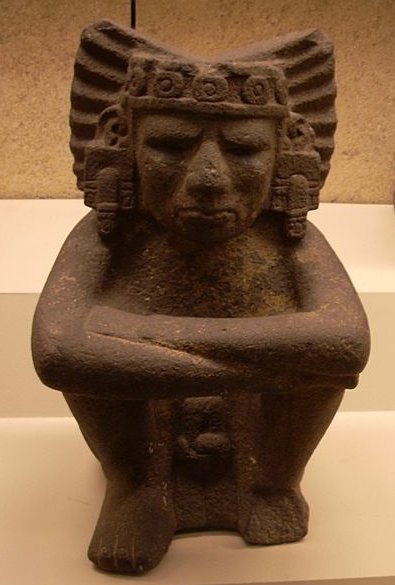
...
In the morning of the world, there was
nothing but water. The Loon was calling,
and the old man who at that time bore
the Raven's name, Nangkilstlas,
asked her why. 'The gods are homeless',
the Loon replied. 'I'll see to it', said
the old man, without moving from the
fire in his house on the floor of the
sea. Then as the old man continued to
lie by his fire, the Raven flew over the
sea. The clouds broke. He flew upward,
drove his beak into the sky and
scrambled over the rim to the upper
world. There he discovered a town, and
in one of the houses a woman had just
given birth
...
|
NOVEMBER 6 |
7 (*231) |
8 |
9 |
10 (314) |
 |
 |
 |
 |
 |
|
Gb1-1 (23 * 10) |
Gb1-2 |
Gb1-3 |
Gb1-4 |
Gb1-5 (314 - 80) |
|
DENEB OKAB
(Eagle's Tail) = δ Aquilae (Ant.)
(294.0),
α VULPECULAE
(Little Fox)
(294.9) |
ν Aquilae (Ant.) (295.0),
ALBIREO = β Cygni
(295.5) |
ALSAFI
(Fire Tripods)
= σ Draconis
(296.0), μ Aquilae (296.3), ι
Aquilae (Ant.) (296.8), κ
Aquilae (Ant.) (296.9) |
ε Sagittae
(297.1), σ Aquilae (Ant.)
(297.4),
SHAM (Arrow)
= α Sagittae
(297.8) |
β Sagittae (298.0), χ Aquilae
(298.3), ψ Aquilae (298.8) |
|
January 9 |
10 (*295) |
11 |
12 |
13 (378) |
|
°January 5 |
6 (*291) |
7 |
8 |
9 (374) |
|
Lucia |
'December
14 (*268) |
15 |
16 (350) |
17 |
|
"November 29 |
30 (*254) |
"December 1 |
2 (336) |
3 |
|
NAKSHATRA DATES |
|
Side a
according to the heliacal
Gregorian calendar SIRIUS was at
°June 30 when NUNKI was close to
the Full Moon (cfr Ga2-11).
Side b
at the time of Julius Caesar
SIRIUS was at 'June 30 when
ROTTEN MELON was close to the
Full Moon (cfr Gb1-18). |
MAY 8 (493) |
9 (*49) |
10 (130) |
11 |
|
Ghost-23 (?)
ρ
Gemini (?) (112.1),
Eskimo Nebula = NGC2392 Gemini
(112.2)
ANTARES (α Scorpii)
|
Al Dhirā'-5 /
Punarvasu-7 /
Mash-mashu-Mahrū-10 (Western
One of the Twins)
CASTOR
(Beaver)
= α Gemini
(113.4) |
ANA-TAHUA-VAHINE-O-TOA-TE-MANAVA-7
(Pillar for elocution)
υ
Gemini (114.0),
MARKAB PUPPIS = κ Puppis
(114.7), ο Gemini (114.8),
PROCYON = α Canis Minoris
(114.9) |
α MONOCEROTIS
(115.4), σ Gemini (115.7) |
|
July 11 |
12 (193) |
13 |
14 (*480) |
|
°July 7 (188) |
8 |
9 |
10 (*111) |
|
'June 14 |
15 (166) |
16 |
17 (*88) |
|
"May 31 (121) |
Maro 1 (*72) - E:17 |
"June
2 |
3 (*64) |
|
i te raa po rae o te.maro.i tomo
ai
te ihu o te vaka.o Ira |
|
Ihu
1. Nose; ihu more, snub
nose, snub-nosed person. 2.
Ihuihu cape, reef; ihuihu
- many reefs, dangerous for
boats. 3. Ihu moko, to
die out (a family of which
remains only one male without
sons); koro hakamao te mate o
te mahigo, he-toe e-tahi tagata
nó, ina aana hakaara, koîa te
me'e e-kî-nei: ku-moko-á te ihu
o te mahigo, when the
members of family have died and
there remains only one man who
has no offspring, we say:
ku-moko-á te ihu o te mahigo.
To disappear (of a tradition, a
custom), me'e ihu moko o te
tagata o te kaiga nei, he êi,
the êi is a custom no
longer in use among the people
of this island. 4. Eldest child;
first-born; term used alone or
in conjunction with atariki.
Vanaga.
1. Nose, snout, cape T (iju
G). Po ihuihu, prow of a
canoe. P Pau.: ihu, nose.
Mgv.: ihu, nose;
mataihu, cape, promontory.
Mq., Ta.: ihu, nose,
beak, bowsprit. Ihupagaha,
ihupiro, to rap on the
nose, to snuffle. 2. Mgv.: One
who dives deep. Ta.: ihu,
to dive. Churchill. Sa.: isu,
nose, snout, bill. Fu., Fakaafo,
Aniwa, Manahiki: isu, the
nose. Nuguria; kaisu, id.
Fotuna: eisu, id. Moiki:
ishu, id. To., Niuē,
Uvea, Ma., Ta., Ha., Mq., Mgv.,
Pau., Rapanui, Tongareva,
Nukuoro: ihu,
id. Rarotonga: putaiu,
id. Vaté: tus,
id. Viti: uthu,
nose. Rotumā: isu,
id. ... usu
and ngusu
... serve as transition forms,
usu
pointing to isu
the nose in Polynesia and
ngusu
to ngutu
the mouth, which is very near,
nearer yet when we bear in mind
that ngutu
the mouth is snout as well and
that isu
the nose is snout too ...
Churchill 2. |
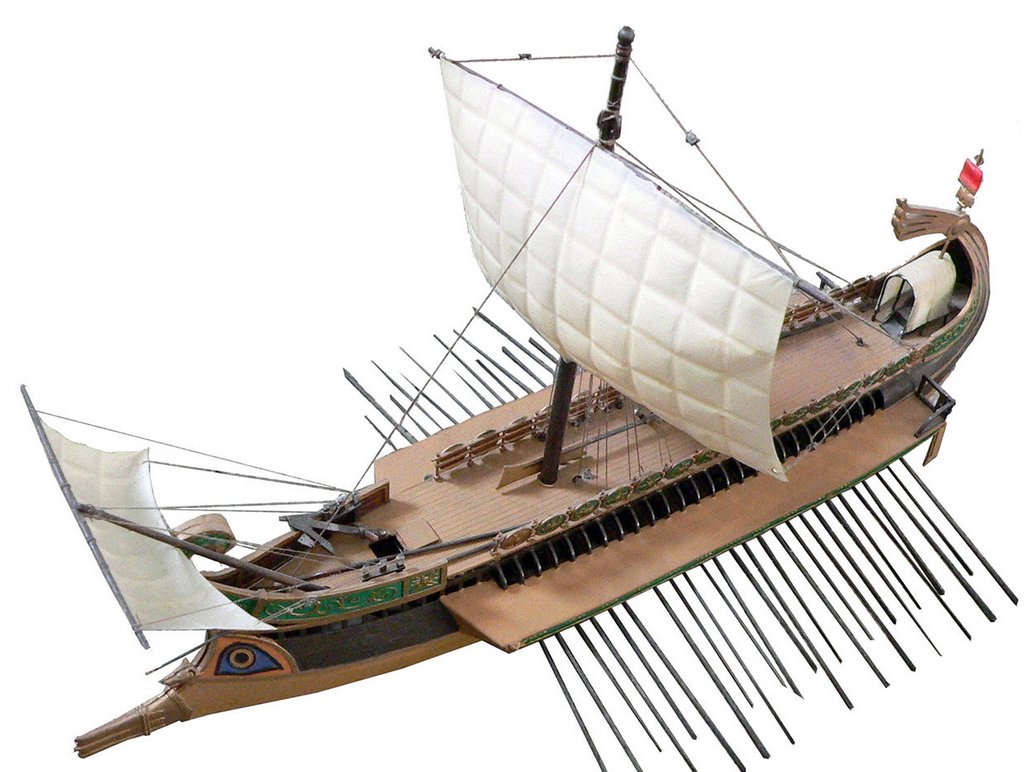
... On the twenty-fifth day [80 + 25 =
115] of the first month (Vaitu Nui),
Ira and Makoi set sail; on
the first day of June ('Maro'),
the bow of Ira's canoe
appeared
on the distant horizon, came closer and
closer on its course, and sailed along,
and finally (one) could see the (new
home) land.
The canoe reached the islets (off the
coast), and Ira saw that there
were three such islets. Ira said,
'Hey you, crew of young men, the vision
of Hau Maka, our father, which he
revealed to me, has come true. There are
'the handsome sons of Te Taanga,
who are standing in the water', for this
is the name that the dream soul of
Hau Maka gave them.
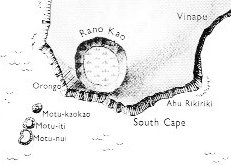
|
Unforgotten are they, these
three. |
kai viri kai viri.ko raua
ana a totoru. |
p. 17 |
|
And therefore this is the
(right) land lying there; |
peira tokoa te kainga e moe
mai era |
|
this is Te Pito O Te
Kainga, which also
received its name from the
dream soul. |
ko te pito o te kainga i
nape ai e toona kuhane. |
|
The canoe continued its
exploration and in a sweep
sailed on to Hanga Te Pau.
|
hokoou.he rarama he oho te
vaka he vari ki hanga.te pau
|
|
They went ashore and took |
he tomo ki uta.he too |
|
the food with them. |
i te kai ki uta. |
p. 18 |
|
They pulled the canoe onto
the beach and left it there.
|
hee totoi i te vaka ki uta
he hakarere. |
|
Ira
sat down with all the other
(companions) |
he noho a ira anake. |
... Later on in this
series of rituals, the Chorti go through a ceremony they
call raising the sky. This ritual takes place
at midnight on the
twenty-fifth of April and continues each night until the rains
arrive. In this ceremony two diviners and their wives sit on
benches so that they occupy the corner positions of the cosmic
square. They take their seats in the same order as the stones
were placed, with the men on the eastern side and the women on
the west. The ritual actions of sitting down and lifting upward
are done with great precision and care, because they are
directly related to the actions done by the gods at Creation.
The people represent the gods of the four corners and the clouds
that cover the earth. As they rise from their seats, they
metaphorically lift the sky. If their lifting motion is
uneven, the
rains will be irregular and harmful ...
|
APRIL 1 (91) |
2 |
3 |
4 (*14) |
 |
 |
 |
 |
|
Ga1-11 |
Ga1-12 |
Ga1-13 |
Ga1-14 |
|
HAEDUS II
= η Aurigae
(75.9) |
5h (76.1)
ε Leporis (76.0),
CURSA
= β Eridani
(76.4), λ Eridani (76.7) |
μ Aurigae, μ Leporis
(77.6) |
ĸ Leporis (78.0),
RIGEL
(Foot)
= β Orionis
(78.1),
Flaming Star = IC405
(78.2),
CAPELLA
= α Aurigae
(78.4), ο Columbae, τ Orionis
(78.8)
THUBAN (α Draconis)
|
|
June 4 (155) |
5 (115 + 41) |
6 |
7 (*78) |
|
°May 31 (151) |
°June 1 (115 + 37) |
2 (*73) |
3 |
|
'May 8 (128) |
9 |
10 (*50) |
11 |
|
"April 24 (114) |
Vaitu Nui 25
(115)
-
(E:17) |
26 (*36) |
27 |
|
NAKSHATRA DATES: |
|
OCTOBER 1 |
2 (*195) |
3 |
4
(277) |
|
17h (258.7)
ARRAKIS = μ Draconis
(258.7) |
Mula-19
SABIK = η Ophiuchi
(259.7),
η Scorpii
(259.9) |
NODUS I = ζ Draconis(260.0),
π Herculis (260.7),
RAS ALGETHI
= α Herculis
(260.8) |
SARIN = δ Herculis
(261.0), ο Ophiuchi (261.4)
ALRISHA (α Piscium)
|
|
December 4 |
5 |
6 (340) |
7 |
|
°November 30 |
°December 1 |
2 (*256) |
3 |
|
'November 7 (*231) |
8 |
9 |
10 (314) |
|
"October 24 (*217) |
25 |
26 |
27 (300) |
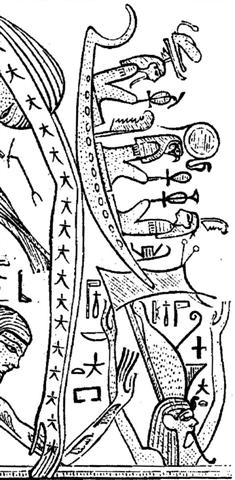
|






















